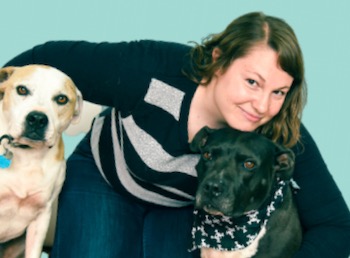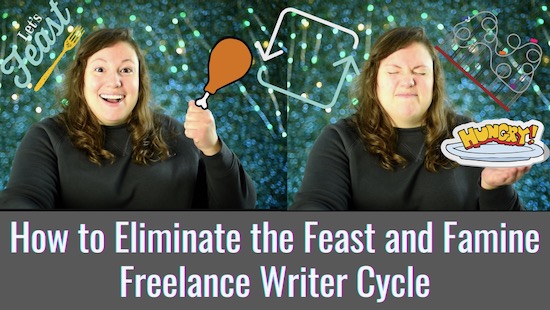If you’re interested in content marketing, freelance writer Mandy Ellis has some good tips!
I always wanted to be a freelance writer and author, but I needed to get a full-time job after college and became a technical writer at an engineering company.
About a year and half into that job, I was told I was going to be laid off at the end of March 2013 and that spurred me to start my business immediately.
I started on oDesk and Elance (now UpWork), luckily got kept on at my full-time job, and over the next year or so worked on growing my income so I could leave my full-time job.
In June 2014, I started freelancing full-time, but in 2016 had to totally rebuild my business, get off the mass platforms, and learn how to pitch and market properly.
Since I started over in 2016, I’ve worked for many of my dream clients, am the breadwinner and bill-payer of my family, and have increased my income every single year.
Figuring Out My Content Marketing Niche Took Me Years
I write in food, restaurants, hospitality tech, real estate, proptech, insurance, insurtech, and health for niches. In terms of writing, I write a lot of reported articles for magazines and businesses in addition to content marketing writing and strategy, case studies, blog post campaigns, messaging and positioning, email campaigns, landing pages, and downloadable resources to name a few.
Basically the gamut of all the freelance writing projects.
Figuring out my niche and what I wanted to write about took me years. I had to hone and refine and figure out what types of clients I liked working with, who I should market to, how to whittle down my types of projects, and which topics I liked.
Some of my niches, like real estate and insurance, I fell into and loved, while others, like food, restaurants, and travel, are what I started out in because they fascinated me.
I think staying open to different niches and topics, working with editors who reached out with different types of assignments, and being curious about various writing types helped me get experience while also building a business that worked for me.
What is a “Content Marketing Strategist?”
As a content marketing strategist, our job is to help our clients map out the types of content that benefit their clients most, drip them out over a designed editorial calendar, and implement any changes that need to be made to better tailor the content to their audience.
For example, there could be keywords or content clusters that dictate what types of content to create like blogs posts and white papers to attract their ideal audience. Or, it could be that they need webinars to explain their product, but then follow up with free downloads or case studies to grow their email list and help clients see their product works for others.
Content marketing is basically the new name for the bulk of content projects that have been around for a while.
They’re executed and reviewed a bit differently now with all the dashboards and tech, but they’re designed to create a suite of content that helps a company create content that attracts their audience, educates them, and hopefully gets them to buy their service or product.
When you’ve got an understanding of content marketing strategy, your clients benefit from your experience, what you’ve seen work for others in their niche, how to attract their type of audience, and grow their potential client base (AKA the amount of sales their business can get).
It’s more than creating the content itself and submitting it to your editor or contact. It’s about planning, creating, executing, and reviewing each piece of content plus the content package as a whole. Many times, companies need an outside pair of eyes to see where they’re falling short of what they missed.
 How Can Authors Use Content Marketing?
How Can Authors Use Content Marketing?
If I was an author trying to sell a book, I’d figure out different types of ways to grow my email list to sell the book to.
Maybe a free checklist to go with the book if it’s teaching them something.
Potentially a mini course that gives them supplemental info that goes alongside the course.
Or maybe a free group that readers could join to discuss the book, or podcast or video show to discuss topics included in the book.
But I’d create different types of content and talk about the book and the topics it covers frequently so when it gets released, it’s exciting for those who’ve been hearing about it, they’re familiar with me and the topic, and they already understand what they get when they purchase.
Revamping My Online Branding Totally Changed the Game for Me
My branding, website, and LinkedIn profile revamp totally changed the game for me. Getting a custom website done and pro branding made me seem more professional as a freelance writer to my potential clients and coaching students.
It also helps when I’m marketing to send over my portfolio that’s searchable to potential clients can find exactly the clips they want to look at.
I make sure I have:
testimonials,
client logos,
clips in my portfolio,
plenty of calls to action,
and very specific descriptions of how I help my clients and who I want to work with.
I want someone to land on my website or LinkedIn profile and know quickly whether or not I’m the right writer or coach for them.
How I Find New Clients as a Content Writer
When it comes to marketing, I’m sending LOIs (Letters of Introduction) through LinkedIn InMails to businesses in my niches and make sure that each of my letters has the right spin for that niche.
Whichever niche potential client I’m sending the LOI to gets the LOI that has my clients who are in their niche. As specific as I can make it to them to help them understand we’re a good fit to work together is where I’m going.
I also keep an ever-growing list of potential clients that I gather from press releases, Crunchbase Daily, TechCrunch, niche publications, PR pitches, and any place that covers my niches that would have info on clients who may be a fit for me.
Then I start up my LOIs and send them on LinkedIn to market to get new clients.
If I ever find myself in a slow period, which can suck, I try to remind myself that doing a bunch of marketing always works. Sending 50 to 75 LOIs in a short period of time can help you get some potential clients in the door for now and later on.
Additionally, I use Boomerang for Gmail to follow up with warm leads. Anytime I get a response to an LOI where they say, “not right now,” then I Boomerang the message for three months out and follow up every three to six months until they change companies or tell me to stop following up.
Why I Say “No” to Small Projects, One-Offs, and Lower-Paid Content Marketing Work
For me, [my most lucrative project] has been reported articles and case studies for businesses. They’re what I love to do and what’s been paying best for me lately. Interviewing and constructing articles and case studies is a fun process for me, pays well, and I’m pretty selective about clients so I’m working with those who I gel with well.
I also do a bunch of content marketing projects where I help with strategy, all of the content pieces within the content marketing plan, and then maybe a download like an ebook. I really like fuller project scopes and try to do those more often.
And it’s active marketing and referrals that help me get more gigs. I’ve made many writers friends over the years who I refer work to or they refer work to me and that’s been a great source of higher paid work that I love. Plus, actively marketing and figuring out who’s already creating a bunch of content that they may need help with allows me to zero in on better assignments.
It’s also about saying no to small projects, one-offs, and lower paid work to make schedule space for larger projects. It’s hard, but when you’re constantly doing small projects for low pay, it’s a pretty clear path to burnout instead of business and financial success.
Becoming a Moderator in the Freelance Writers Den Put Me On the Coaching Path
Throughout my freelance career, getting coaching has made the difference. Being able to check in, ask questions, and get help when I needed it was key to getting me to where I am now. I wanted to provide that for other up-and-coming writers like the help I got.
Plus, I started getting questions in my inbox, mentoring writers through ASJA (American Society of Journalists and Authors), and figured it made sense to go into coaching other writers.
Deciding to become a moderator in the Freelance Writers Den really put me on the coaching path, and mentoring writers through ASJA solidified it. I loved the Den and helping other writers and have been a moderator for five years and ran a few bootcamps with Carol Tice. But when I got into ASJA mentoring, that made it clearer that I liked the one-on-one experience of coaching and answering specific questions from other freelance writers.
Top three things to be successful:
1) Keep going, follow up, and be a nice human
2) Always be marketing and learning
3) Create a business you like to run with clients who value you and your work
I Started on YouTube to Add More Value to My Writing Audience
I started on YouTube to livestream each week to add more value to my audience beyond weekly emails. Over the time that I’d been sending an email each week, I felt like I had more to talk about and wanted more interaction with other writers rather than just putting out the newsletter.
YouTube allowed me to create video, which I was scared of but now really enjoy, talk to other writers live and answer questions, and do something different outside of writing all the time. It’s fun to write, but when you write 90 percent of the time, it’s nice to try something for fun like a YouTube livestream and get creative and experimental again.
I always plan out my livestreams so I have a schedule of what’s coming up, know what I’ll talk about, and remind writers on social to tune in and ask questions.
If you want to do video, just jump in. It’ll be scary and awkward and weird…but eventually, the camera won’t feel so strange, the interactions with commenters and viewers will be super fun, and the reach you get with video will be much wider.
It’s a cool experience to see people who don’t want to read email newsletters tune into video instead…gives them more options to learn and grow.

It’s Not About “When” Something Will Happen, but How Much You’re Doing to Make It Happen
I always tell new or young writers to not give up, be persistent and consistent, keep marketing, and know who they’re talking to and why.
I think niches help you figure out direction in your business, formulate your marketing, and learn more so you can grow your business. Then, you’re able to raise your rates based on your expanding experience and knowledge, refine your client base, and market to different types of clients to vary your business.
It’s not always about “when” something will happen, but how much you’re doing within your control to make something happen. I used to (and sometimes when I’m at a low point still do) worry about “when” certain things will happen in my business…but the secret is there’s no predictor or magic wand to wave.
It’s about what you can control, like your profiles, website, marketing, clip types, clients, and rates, and then working on making those better over time. If you continue to work smarter over time instead of overextending yourself constantly, you’ll have a fantastic freelance writing business with plenty of income.
* * *
About Mandy
 Mandy Ellis an Austin-based freelance writer whose created food, real estate, travel, health, and insurance content for clients like Costco, eBay, Condé Nast Traveler, AFAR, the National Association of REALTORS, the California Association of REALTORS, U.S. News & World Report, Austin Monthly, FSR, and QSR.
Mandy Ellis an Austin-based freelance writer whose created food, real estate, travel, health, and insurance content for clients like Costco, eBay, Condé Nast Traveler, AFAR, the National Association of REALTORS, the California Association of REALTORS, U.S. News & World Report, Austin Monthly, FSR, and QSR.
She focuses on reported articles, content marketing and strategy, case studies, blog post campaigns, and marketing messaging and positioning. She’s a member of ASJA and mentored many ASJA writers as well as taught bootcamps alongside Carol Tice in her Freelance Writers Den community.
For more information on Mandy and her work, please see her website, or connect with her on LinkedIn and Instagram.
You can also get her Free Freelance Writer Pricing Guide or contact her for Freelance Writing Coaching.

